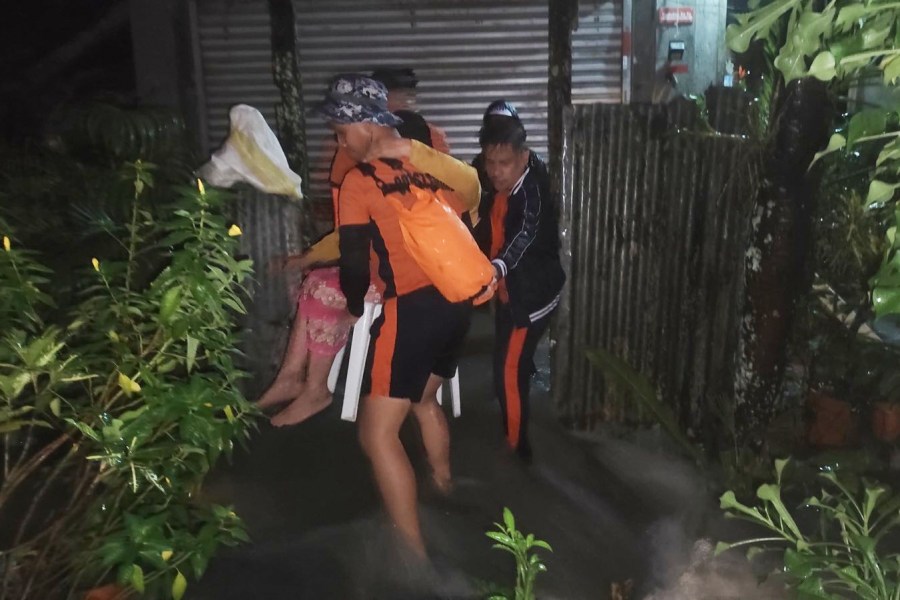World
Tropical Storm Bualoi Strikes Philippines, Causing Four Fatalities

A tropical storm struck the Philippines on March 15, 2024, resulting in at least four fatalities and prompting the evacuation of over 73,000 residents from vulnerable areas. Tropical Storm Bualoi, which made landfall in the town of San Policarpo in Eastern Samar province late Thursday, has caused significant disruption, particularly in areas prone to landslides and flooding.
Bualoi, locally referred to as Opong, arrived with sustained winds of 110 kilometers per hour (68 miles per hour), leading to power outages and minor landslides in various towns. According to the country’s disaster-mitigation agency, the storm’s impact was felt across multiple regions, with the four recorded deaths occurring in the central island province of Masbate. Victims included individuals struck by falling trees, debris, and a lightning strike.
Ricardo Kho, Governor of Masbate, emphasized the urgent need for clearing operations to restore access to road networks, which have become impassable for delivering essential food and health assistance. “We also need help to have our ports reopened as early as possible for us to receive help from different provinces,” Kho stated during a press conference.
Impact of the Storm
The storm is the latest in a series of weather events affecting the region. Prior to Bualoi, Typhoon Ragasa had wreaked havoc, causing at least 25 deaths primarily due to flooding in the northern Philippines and neighboring Taiwan. Following its landfall in China, Ragasa dissipated over Vietnam.
As Bualoi continues its northwest trajectory, it poses a risk to coastal provinces south of Manila and is expected to enter the South China Sea. Philippine meteorologists warn that the storm could regain strength, potentially evolving back into a typhoon as it moves toward Vietnam.
The timing of this storm coincides with ongoing investigations into corruption related to flood control projects in the Philippines. Allegations have surfaced implicating various lawmakers, including allies of President Ferdinand Marcos Jr., in a scandal involving significant kickbacks tied to infrastructure initiatives. This situation has ignited public anger and protests in a nation already vulnerable to natural disasters.
Evacuations and Preparedness
In anticipation of Bualoi’s arrival, local authorities initiated evacuations in Eastern Samar and Northern Samar provinces, guiding residents to government emergency shelters. The swift action highlights the ongoing challenges faced by communities in a country frequently impacted by tropical storms and typhoons.
The Philippine Atmospheric, Geophysical and Astronomical Services Administration reports that Bualoi is the 15th tropical cyclone to hit the Philippines this year. With a rain and wind band extending approximately 450 kilometers (280 miles) from its center, the storm highlights the region’s vulnerability to extreme weather patterns, which are becoming increasingly frequent due to climate change.
As the nation rallies to respond to the needs of affected communities, the focus remains on restoring safety and access while addressing the broader implications of infrastructure integrity and accountability in the face of natural disasters.
-

 Lifestyle4 months ago
Lifestyle4 months agoLibraries Challenge Rising E-Book Costs Amid Growing Demand
-

 Sports4 months ago
Sports4 months agoTyreek Hill Responds to Tua Tagovailoa’s Comments on Team Dynamics
-

 Sports4 months ago
Sports4 months agoLiverpool Secures Agreement to Sign Young Striker Will Wright
-

 Lifestyle4 months ago
Lifestyle4 months agoSave Your Split Tomatoes: Expert Tips for Gardeners
-

 Lifestyle4 months ago
Lifestyle4 months agoPrincess Beatrice’s Daughter Athena Joins Siblings at London Parade
-

 Science3 months ago
Science3 months agoSan Francisco Hosts Unique Contest to Identify “Performative Males”
-

 World4 months ago
World4 months agoWinter Storms Lash New South Wales with Snow, Flood Risks
-

 Science4 months ago
Science4 months agoTrump Administration Moves to Repeal Key Climate Regulation
-

 Business4 months ago
Business4 months agoSoFi Technologies Shares Slip 2% Following Insider Stock Sale
-

 Science4 months ago
Science4 months agoNew Tool Reveals Link Between Horse Coat Condition and Parasites
-

 Sports4 months ago
Sports4 months agoElon Musk Sculpture Travels From Utah to Yosemite National Park
-

 Science4 months ago
Science4 months agoNew Study Confirms Humans Transported Stonehenge Bluestones









